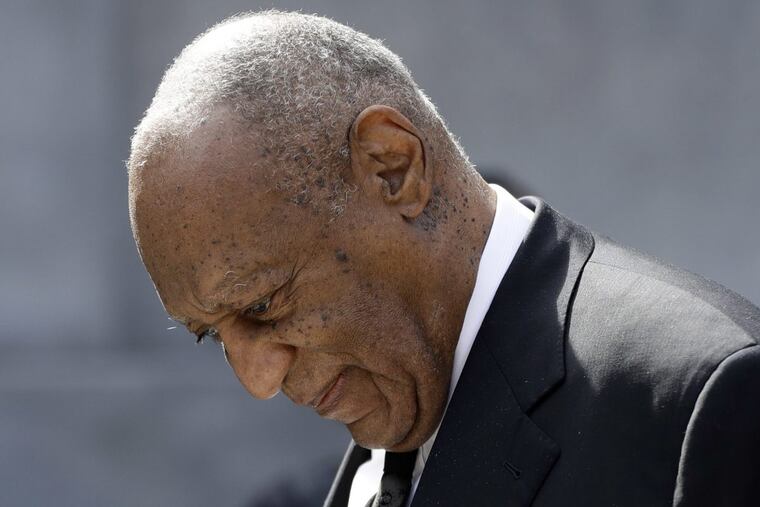What Bill Cosby's retrial can teach employers about workplace sexual harassment | Opinion
If the #MeToo revelations have shown us anything, it is that the "top dogs" at companies and organizations can be the worst offenders in dealing with underlings and mixing work and sex.

As the media spotlight returns to Bill Cosby's sexual-assault criminal case — now being retried after a deadlocked jury ended the first case in mistrial — employers and their employees can learn valuable lessons about the new realities of sexual harassment and assault in the #MeToo age.
Lesson 1: No claim is too old to be relevant anymore.
In the first trial, before the #MeToo wave of claims against Harvey Weinstein, Al Franken, Garrison Keillor, and others, the Cosby trial judge limited the prosecution to just one other woman alleging sexual misconduct against him.
This year, that has changed dramatically with the same judge recently ruling that in the retrial the prosecution can present five women to testify about their allegations that Cosby drugged and/or sexually assaulted them in the 1980s and 1990s – more than 20 years ago.
Allowing such stale claims of similar conduct to be aired at trial is a stunning change in American jurisprudence. Most criminal laws require claims within two to 12 years, and most employment statutes require sexual-harassment lawsuits to be brought within six months to two years of the alleged wrongdoing. These prompt deadlines help to preserve evidence and ensure trials are decided based on fresh memories by all available witnesses, not gauzy reconstructions from decades ago.
The #MeToo movement has changed this analysis by demonstrating that victims of sexual harassment and assault often do not come forward for years out of fear for their well-being or careers. The delay does not make their claims false or worthless — but possibly less credible. Expect aggressive challenges at trial.
Lesson 2: Sexual misconduct is real and pervasive.
Seeing hundreds of everyday women come forward in the #MeToo era with their tearful and explicit stories of sexual harassment and assault — and without seeking money, just to uncover the misconduct of the harassers — has made the public realize that this misconduct really is rampant and happening to women everywhere — in Olympic training camps, in newsrooms, in government buildings, on movie sets, in tech firms, the list goes on and on. As a result, each new claim is likely to be seen as more credible — and more dangerous to the alleged harasser and the employer — than they would have been absent the #MeToo movement.
Lesson 3: Harassment and its cure start at the top.
If the #MeToo revelations have shown us anything, it is that the "top dogs" at companies and organizations can be the worst offenders in dealing with underlings and mixing work and sex.
Power can corrupt, and CEOs, elected officials, and celebrities like Cosby often see themselves as invincible, superior, super-charismatic, and able to get away with often disgusting and criminal behavior through the force of their personalities and outright lies. They are wrong.
Every organization in America needs to be looking at its top leadership to determine whether it has harassment problems that have been allowed to fester. Bad behavior that once was tolerated or swept under the rug because of the power of the harasser, as in the case of Harvey Weinstein and Roger Ailes, is now more likely than ever to be exposed as a cultural cardinal sin of an organization, to its great detriment — even bankruptcy, as in the case of the Weinstein Cos.
Lesson 4: Use the news to prompt training and better policies.
Perhaps the biggest lesson from the #MeToo movement is that if employees are not empowered to oppose sexual harassment in the workplace, they might not report it internally, leading to a sexualized culture that alienates top talent, customers, and the public — especially when it is broadcast outside the company in a media frenzy. The best way to prevent (or remedy) such a culture is to have regular, detailed training — with attendance and vocal support from the C-suite — on what is and is not acceptable at work in terms of sexual conduct, harassment, and equal opportunity. The training should include details on how to report misconduct when it occurs, with a policy and practice that prohibit retaliation against those who come forward. Effective training by a qualified expert will arm employees to fight back internally against harassment. Even better, the law provides an affirmative defense to employers who take reasonable steps to prevent harassment in the workplace, including training and enforcement of an anti-harassment policy.
While leadership may have been hesitant in the past to spend productive time on such training, the downfall of CEOs, boards, and stock prices in major companies after #MeToo eruptions should prompt every responsible employer to want to address the situation now, proactively. Use the #MeToo movement to prompt leadership to ask: "What about us? Are we vulnerable? What can we do to inoculate ourselves?"
Michael Homans practices employment law in Philadelphia, representing both employers and employees.